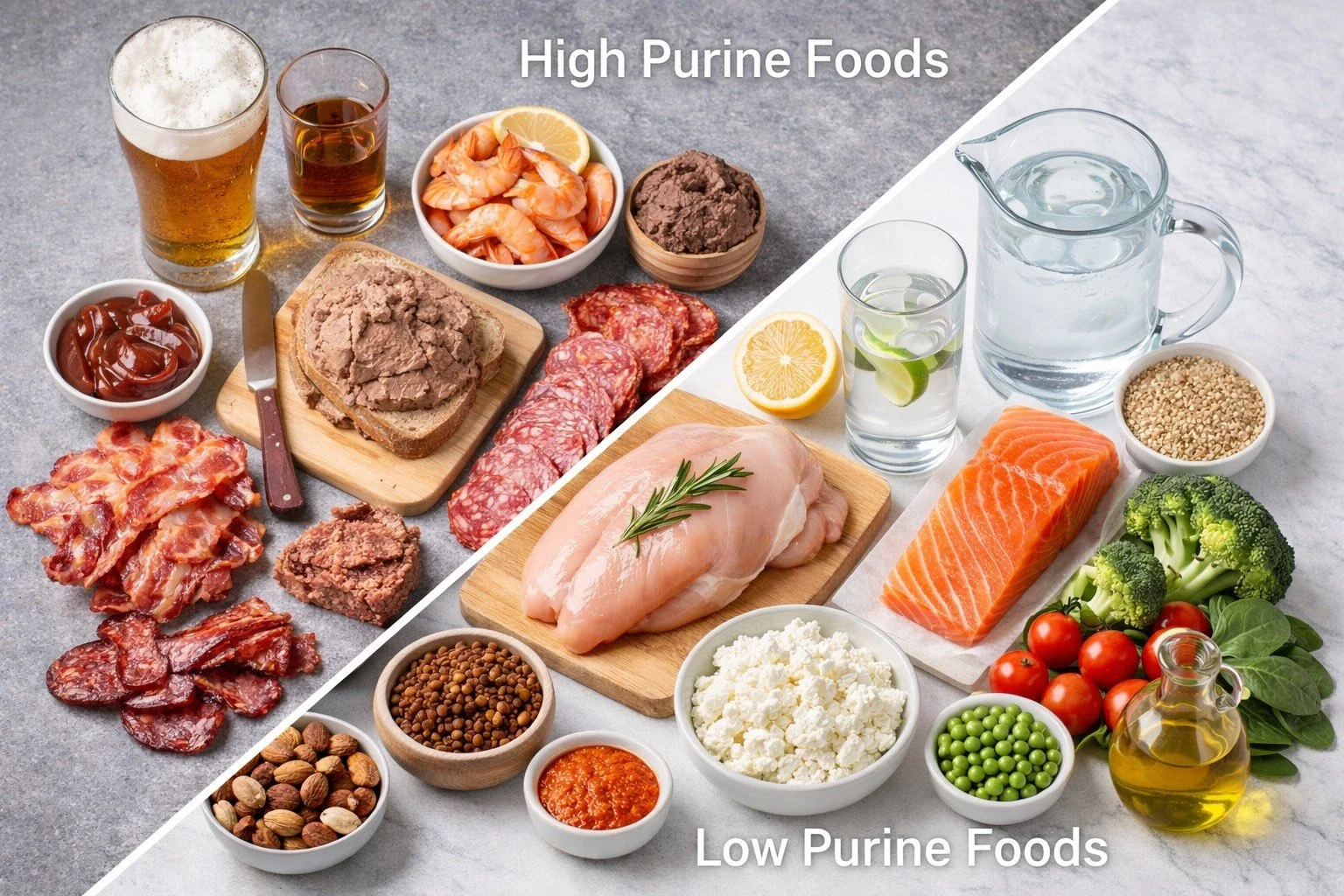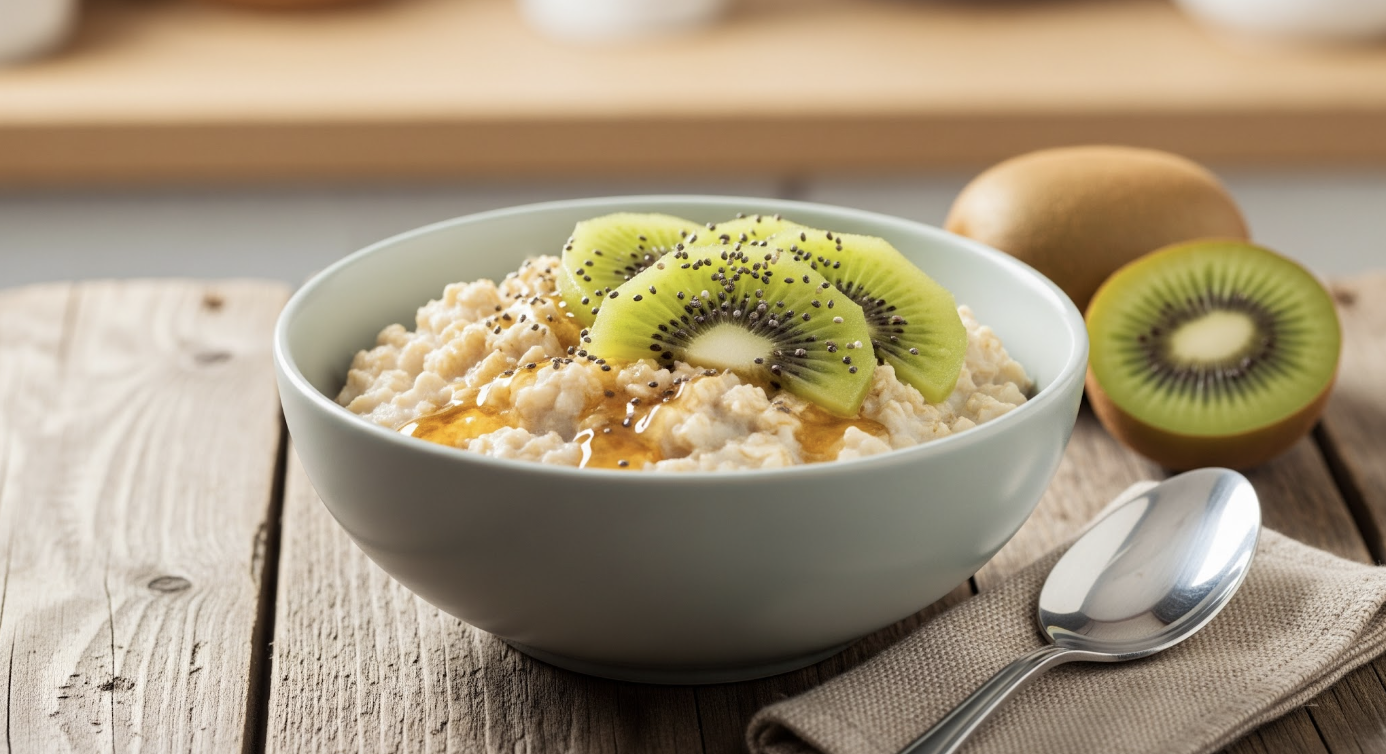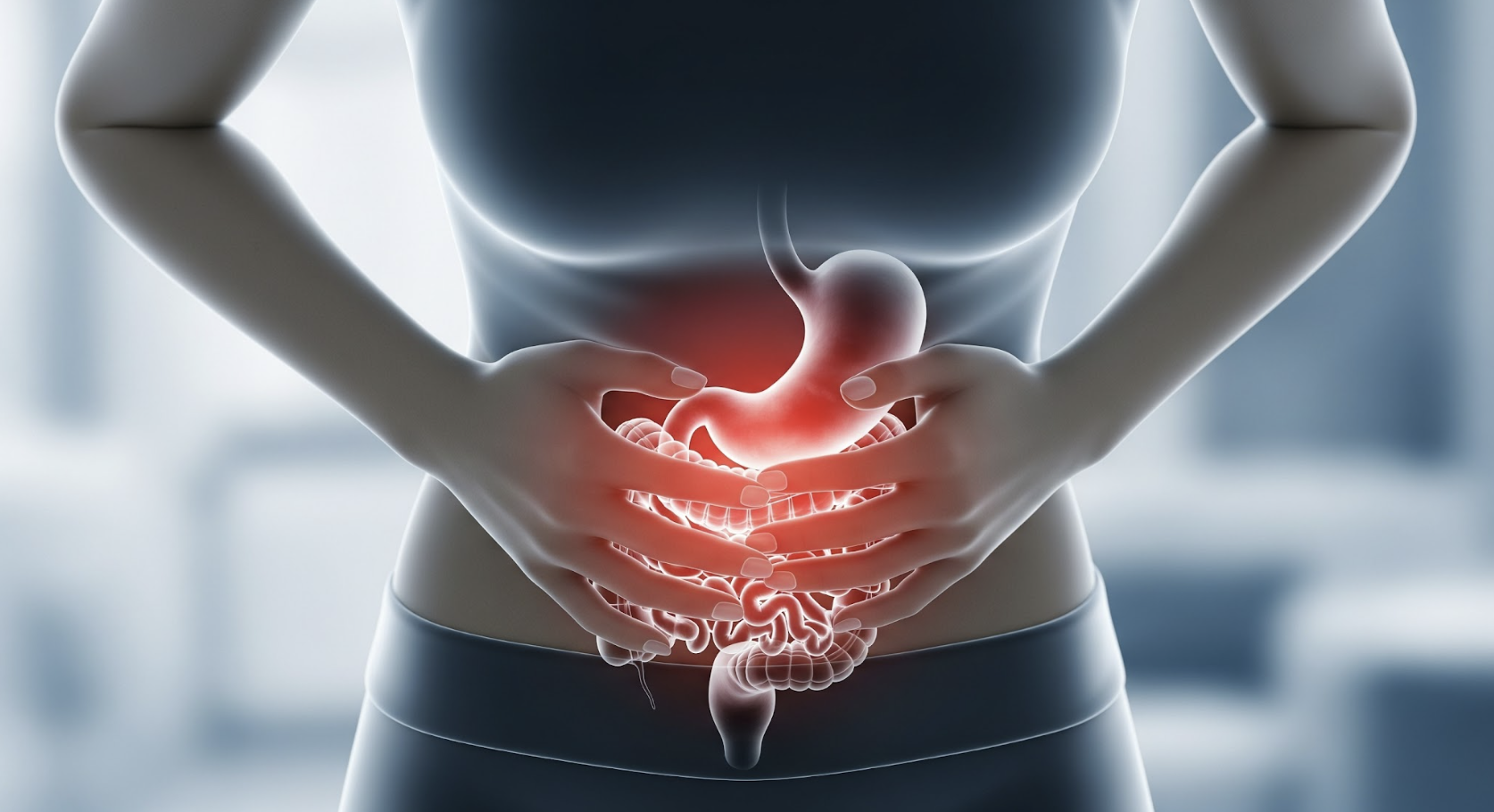
Gout on Your Plate: What this Looks Like and Smarter Food Choices to Reduce Flares
Gout is an inflammatory arthritis caused by raised urate levels (uric acid) leading to crystal formation in and around joints. When the immune system reacts to these crystals, you get the classic sudden, intensely painful flare.
Typical features include:
Rapid onset (often overnight) of severe joint pain
Marked swelling, redness and heat
Extreme tenderness (even a bedsheet can feel unbearable)
Often one joint at first (“monoarthritis”)

Practical Tips for Christmas Day and Boxing Day
Alternate Alcohol With Non-Alcoholic Drinks
You do not need to avoid alcohol completely to reduce its impact.
A simple and effective strategy is to alternate:
One alcoholic drink
One non-alcoholic drink (water, sparkling water, alcohol-free option)
This helps reduce total alcohol intake, improves hydration, and often slows drinking pace without reducing enjoyment.
2. Prioritise Hydration
Aim to start the day with water before coffee or alcohol appears. Keeping a jug of water on the table during meals makes a surprising difference.
Good hydration helps:
Reduce bloating
Support digestion
Reduce headaches
Improve energy levels
Warm drinks such as herbal teas can also be helpful, particularly in the evening.

Processed Meats at Christmas: What’s the Real Risk and How Can We Reduce It?
Ham at breakfast, pigs in blankets at lunch, sausage rolls at snack time — the festive season is one of the few periods of the year when processed meats can become a near-daily feature for many households. Alongside the tradition and enjoyment, however, comes an important nutritional conversation about nitrites and nitrates — substances commonly used in processed meats and consistently linked with bowel cancer risk.
This is not about fear-mongering or banning Christmas foods. It is about understanding the science, making informed choices, and reducing risk where we realistically can, in line with NHS cancer-prevention advice and NICE principles on long-term disease prevention.

Supplements… The Fact, Fiction and Mystery Debunked
From magnesium sprays and tablets promising a dreamlike sleep to turmeric shots claiming an invincible immune system, the supplement aisle is brimming with claims. It’s hard to tell fact from fiction. These days, supplement aisles resemble modern apothecaries, not just in standard stores and pharmacies but also in supermarkets. Patients often wonder if these capsules and trinkets truly work or if they’re simply expensive and colourful urine. While some supplements have solid evidence, others are more myth than medicine. This guide simplifies the world of popular pills by explaining their intended effects, what research says and when they might be worth considering.

When the Clocks Change: How Nutrition Can Help You Sleep Better
By Dr Timothy Eden, MBBS
Registered Dietitian from Eden Health and Nutrition
Read time approx. 4mins
As the clocks go back and evenings draw in earlier, many of us start to feel our energy dip. It’s not just “winter blues”; the darker days genuinely affect our body clock (circadian rhythm), which controls when we feel alert or sleepy. Less natural light exposure, particularly in the morning, can make it harder to fall asleep at night and lead to groggy mornings.
I wanted to write about this because I see, in both my GP and dietetic practice, just how many people struggle with sleep around this time of year. Often the first response is to reach for caffeine, sugary snacks or comfort foods to push through the fatigue — yet few people realise how profoundly nutrition and routine can influence sleep quality itself.

Constipation and Fibre: What You Need to Know
By Dr Timothy Eden, MBBS
Registered Dietitian from Eden Health and Nutrition
Read time approx. 4mins
Constipation is one of the most common gut problems we see in the UK, affecting around 1 in 7 adults and up to 1 in 3 children at any given time (1). It usually means having fewer than three bowel movements a week, straining to pass stools or feeling that you haven’t completely emptied your bowels. While it can be an occasional nuisance for many people, persistent constipation can cause discomfort and have a big impact on day-to-day life and is a common reason why people seek input from their GP or dietitians.

IBS and Gut Symptoms: What You Should Know Before Changing Your Diet
By Dr Timothy Eden, MBBS, RD from Eden Health and Nutrition
Read time approx. 4mins
As a GP and registered dietitian working in the UK, I wanted to write this post because almost every week in clinic I meet patients who have lived with bowel or stomach symptoms for months – sometimes years – before seeking help. Many have tried to self-manage using magazine articles, online blogs, or word of mouth. While that shows initiative, it often leads to frustration and limited success. I also hear the “low FODMAP diet” mentioned almost daily, but this is a highly restrictive approach that is not meant to be a first-line strategy and can be harmful if done without the right support. This post aims to give a clear, evidence-based overview of what to expect if you see your GP, and some first steps you can try safely with diet.
How stomach symptoms present and how common IBS is
Bowel and stomach complaints are among the most common reasons people visit their GP. Symptoms include bloating, abdominal pain, cramping, diarrhoea, constipation, or fluctuating bowel habits. Irritable Bowel Syndrome (IBS) is one of the most frequent diagnoses, with prevalence estimates around 10–15% of adults in the UK (BDA, 2023). Although IBS is not life-threatening, it can have a major impact on quality of life.

Creatine Supplements: What You Need to Know & When to Tell Your Doctor
By Dr Timothy Eden, MBBS, RD from Eden Health and Nutrition
Read time approx. 4mins
Why Is Everyone Talking About Creatine?
Creatine supplements have rapidly grown in popularity in recent years, frequently promoted by personal trainers, fitness enthusiasts and nutrition influencers across social media. Once a product mainly found in the gym bags of bodybuilders and athletes it’s now commonly used by everyday gym goers and those looking to maintain muscle mass with age. This shift reflects a broader cultural move towards health and fitness among younger and more diverse groups. While creatine is often marketed as a “pre-workout” supplement, its benefits extend beyond this with increasing evidence supporting its role in enhancing exercise performance and supporting muscle maintenance particularly when paired with adequate protein intake and resistance training.
But is it safe? Who should be cautious? And why might it be important to mention to your doctor? Let’s take a closer look.

Vitamin D – The One Supplement I Take All Year Round
By Dr Timothy Eden, MBBS
Registered Dietitian from Eden Health and Nutrition
Read time approx. 4-5mins
In the world of nutrition and preventative health, few nutrients have attracted as much attention as vitamin D in recent years and for good reason. Once primarily associated with bone health, we now know that vitamin D plays a much broader role, influencing everything from immune function to muscle strength, mood regulation and potentially even chronic disease risk. Emerging research continues to link low vitamin D levels with a range of health issues, including autoimmune conditions, infections, cardiovascular disease, and even certain cancers.¹ ²
Yet despite its importance, suboptimal levels of vitamin D or even outright deficiency remain surprisingly common and often go unnoticed. Many individuals may not realise they’re lacking it until symptoms such as fatigue, low mood, frequent infections or bone pain begin to emerge. The good news? Vitamin D is safe, inexpensive and easy to supplement. While the scientific literature continues to explore whether low vitamin D levels directly cause these issues or are simply associated with them as markers of poor health, teasing out causation from correlation can be complex. Nonetheless, given its favourable safety profile, low cost and potential benefits this is one supplement that many consider worth taking as a precautionary measure. It’s also the one I personally choose to take all year round.

Healthy BBQs: Enjoy the Sunshine Without the Worry
By Dr Timothy Eden, MBBS
Registered Dietitian from Eden Health and Nutrition
Read time approx. 5mins
We all love a barbecue when the sun is shining and I was prompted to write this after a recent visit to my South African friends who reminded me this is actually an all year round tradition and suffice to say this did not disappoint! However, while BBQs are great for socialising they can easily become one big “meat feast” sometimes neglecting balance, health and maybe intentionally food safety. The good news? With a few small tweaks you can enjoy a delicious, safe and nutritious BBQ without compromising on flavour or fun and avoiding the unwanted after-effects of any BBQ mishaps.
This article explores practical tips for making your next BBQ both healthy and enjoyable, covering food safety, optimising healthier options and ways to add more variety and nutrition to the grill.
